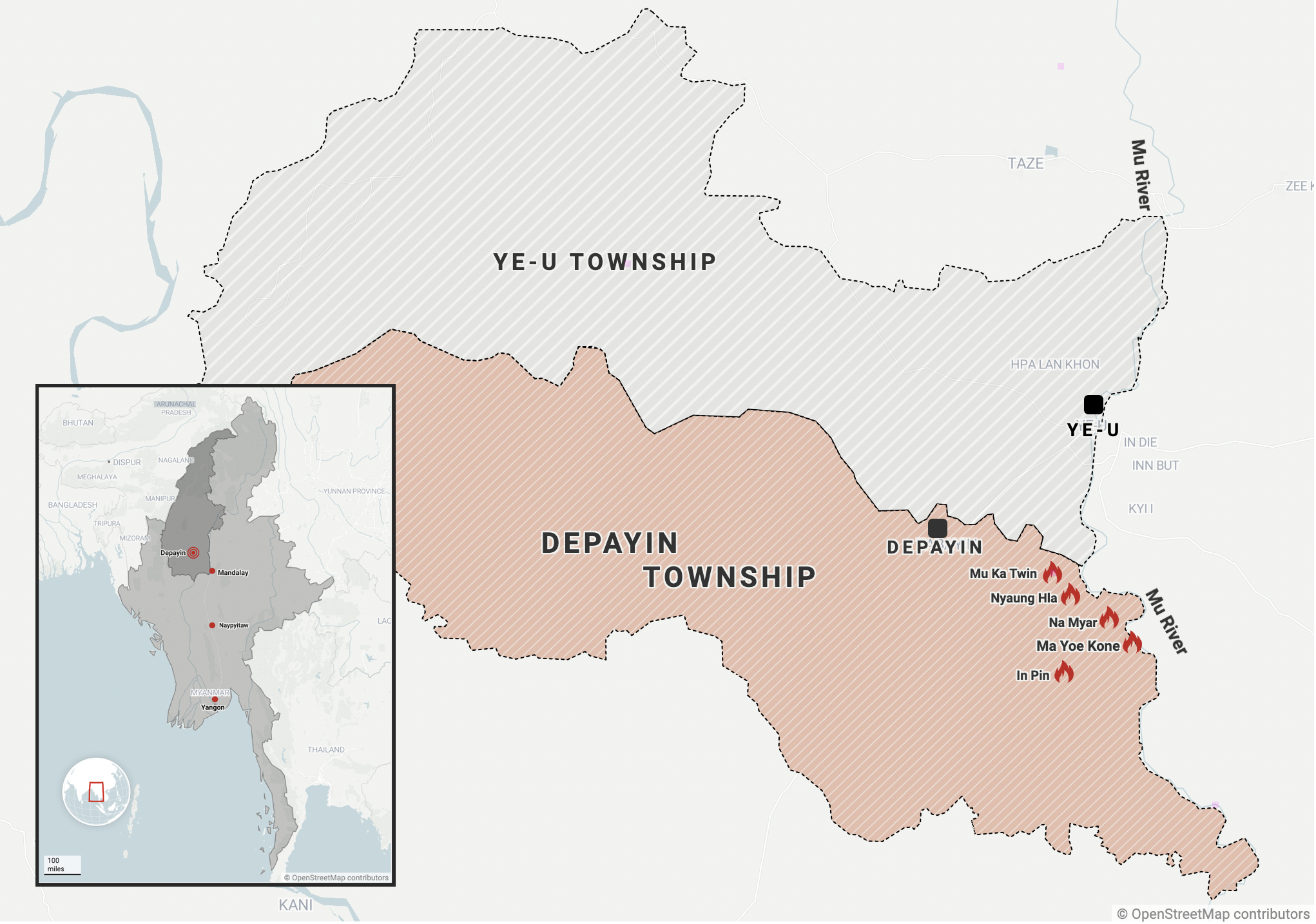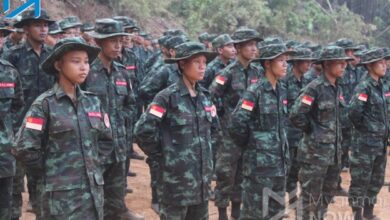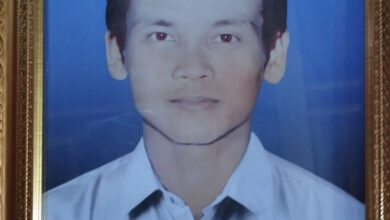
Myanmar junta troops set more villages in the country’s heartland ablaze in recent weeks in an attempt to punish residents for offering support to the anti-coup resistance movement.
More than 2,000 households in at least 19 villages in Sagaing Region’s Depayin Township were destroyed in the latest campaign of military raids which began on November 30 and has included repeated assaults on some locations.
Depayin sits west of the Mu River, a critical tributary of the Ayeyarwady, the country’s biggest waterway. The township is a prominent resistance stronghold, where anti-regime armed forces have been fighting against the occupying soldiers stationed there by the junta since the months that immediately followed the February 2021 military coup.
Two Myanmar army columns departing the towns of Ye-U from the north on November 30 and Depayin from the west on December 3 systematically struck area villages as they advanced through the township. The assaults resulted in the deaths of three civilians, with several more still missing at the time of reporting, according to sources within the resistance.

The communities that bore the brunt of the raids were Na Myar, Nyaung Hla, In Pin, Letyetkone, Mu Ka Twin, and Ma Yoe Kone, where nearly 1,300 houses were torched in total by the regime forces, the resistance sources said, citing data collected after the soldiers had left.
In Ma Yoe Kone, more than 90 of around 400 households were burned. It was in Ma Yoe Kone that the three civilian casualties of the campaign were killed by junta troops, in attacks perpetrated on December 4 and 9.
One house and a two-storey monastery building—which held ancient Buddhist relics and other sacred items—were destroyed in the village during the first arson attack, a resident monk told Myanmar Now on the condition of anonymity.
“Never in my whole life have I seen such despicable people,” he said, referring to the Myanmar army soldiers. “All forms of life, including humans and animals, are in crisis because of them. All of us have been on the run. They have really lost their humanity.”
After the second assault, the bodies of the three slain residents were found, a Ma Yoe Kone local said, adding that only two of the victims could be identified: 70-year-old Chit Lay, who had a bullet wound to the head, and an 80-year-old woman named Daw Paing, found dead inside her burned home.
All that remained of the third body, which had been burned, was a skull and bone fragments.
“Charred remains, including a skull and some parts of the spine, were found,” the villager explained. “[The soldiers] burned the body on a pile of wood. Another one was shot dead. One of the bodies belonged to a blind woman who we had to leave behind as she couldn’t run.”
During the December 9 raid, 90 more homes were burned down, most of which belonged to the village’s more affluent residents, who were believed to have provided support to the resistance.
“They targeted wealthy households. Almost the entire central part of the village is gone. Those were where all the big houses were,” the local told Myanmar Now.
A resident from Letyetkone, which was raided by regime forces on December 10, said that some 200 homes were lost in the attack, which was perpetrated even though there had been no recent clashes between resistance fighters and the Myanmar army in the area.
No Letyetkone residents were arrested or killed, as most managed to flee before the raid began, he said.
The military launched an airstrike on the village’s school in September in which seven children and six other residents were killed.
“Our houses were reduced to ashes again. There weren’t even any clashes near us. The locals fled when they started firing heavy artillery shells as they entered the village,” the resident explained.
Junta forces terrorised the village of Me Oe on December 11, reportedly leaving behind a threat written on a blackboard in its school, warning that those who supported members of the anti-regime People’s Defence Force (PDF) would “suffer.”
“The more you support the PDF, the more you will suffer from war,” the message, seen by Myanmar Now, said. “The more villages are reduced to ashes, the more you will be forced to live in areas where there is no infrastructure. As long as one supports the PDF rebels, they will surely suffer.”
Thatti, who leads a local anti-junta defence team operating in Depayin, described the military’s destruction of villages in the township as vengeful and cowardly.
“As we all know, Depayin is a stronghold of the revolutionary forces in Sagaing. The regime can’t get a foothold here… Maybe that is why they are picking on this place,” he said. “They appear to be sparing no village. If they are able to fight, the soldiers do not need to burn down local households. They should just find where the PDFs are and fight us, even kill us. But setting houses on fire is despicable.”
![Resistance fighters holding heavy weapons ammunition in central Myanmar. (Photo: Freedom Revolution Force [FRF])](https://myanmar-now.org/en/wp-content/uploads/sites/5/2024/04/438869056_443267851680128_1706386881626943924_n-390x220.jpeg)


